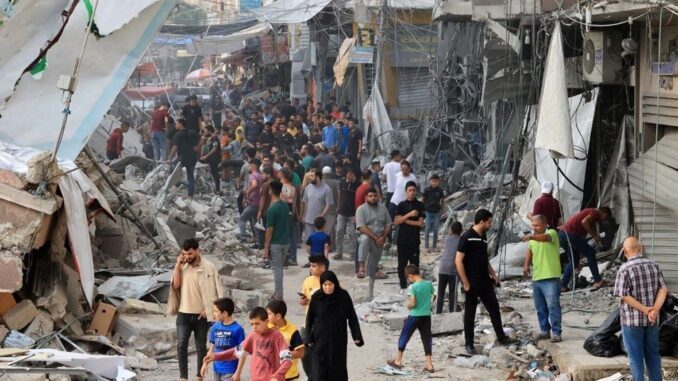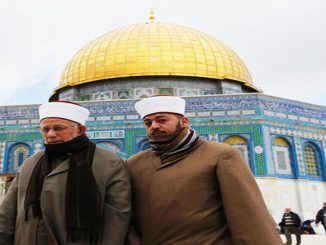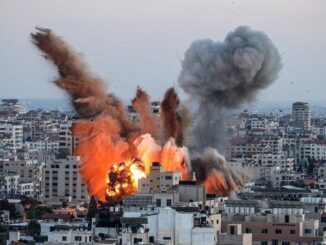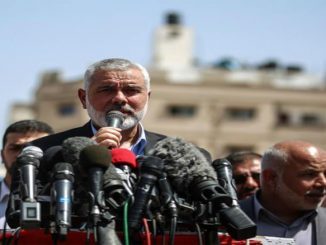
Egypt reportedly discussed the Gaza aid, but rejected allowing corridors for civilians, fleeing the war. Egypt has long restricted the flow of Gazans on to its territory, even during the fiercest conflicts.
Egypt has discussed plans with the United States and others to provide humanitarian aid through its border with Gaza Strip but rejects any move to set up safe corridors for refugees fleeing the enclave, Egyptian security sources said on Wednesday.
Egypt’s Abdel Fattah al-Sisi said the escalation in Gaza was “highly dangerous” and that Egypt was pursuing a negotiated solution to the violence with regional and international partners.
Egypt would not allow the issue to be settled at the expense of others, Sisi said in comments reported by state news agency MENA, an apparent reference to the risk that Palestinians could be pushed into Sinai.
Egypt is moving to avert a mass exodus from the Gaza Strip into its Sinai Peninsula, as Israeli bombardment halted crossings at the main exit point from the Palestinian enclave on Tuesday, Gaza officials and Egyptian security sources said.
U.S. National Security Advisor Jake Sullivan said the U.S. had been holding consultations with Israel and Egypt about the idea of a safe passage for civilians from Gaza, which was hit by a massive Israeli assault in response to a deadly incursion by Hamas fighters into Israel. Those consultations were ongoing, U.S. Secretary of State Antony Blinken said on Wednesday.
Cairo, a frequent mediator between Israel and the Palestinians, always insists the two sides resolve conflicts within their borders, saying this the only way Palestinians can secure their right to statehood.
One of the Egyptian security sources, who asked not to be identified, said Egypt rejected the idea of safe corridors for civilians to protect “the right of Palestinians to hold on to their cause and their land”.
Gaza, a tiny coastal strip of land wedged between Israel in the north and east and Egypt to the southwest, is home to some 2.3 million people who have been living under a blockade since Palestinian resistance group Hamas took control there in 2007.
Israel’s assault on Gaza has caused alarm in Egypt, which has urged Israel to provide safe passage for civilians from the enclave rather than encouraging them to flee southwest towards Sinai, two Egyptian security sources said.
The Rafah border crossing remained shut on Wednesday morning, after Egyptian military planes conducted flights nearby overnight, security sources said. The military has also taken up new positions close to the border, running patrols to monitor the area, said Ahmed Salem of the Sinai Foundation for Human Rights.
Rafah is the sole possible crossing point into Sinai for Gaza’s 2.3 million residents. The rest of the densely populated strip is surrounded by the sea, and by Israel, which has announced a total siege of Gaza and could launch a ground offensive.
U.N. Secretary-General Antonio Guterres said on Wednesday that crucial life-saving supplies, including fuel, food and water, must be allowed into Gaza.
“We need rapid and unimpeded humanitarian access now,” he told reporters, thanking Egypt “for its constructive engagement to facilitate humanitarian access through the Rafah crossing and to make the El Arish airport available for critical assistance.”
U.N. spokesman Stephane Dujarric later said: “Civilians need to be protected. We do not want to see a mass exodus of Gazans.”
The passage of people and goods in and out of Gaza is strictly controlled under a blockade enforced by Egypt and Israel.
On Tuesday, the Israeli military revised a recommendation by one of its spokespeople that Palestinians fleeing its air strikes in Gaza head to Egypt.
Israel has been pounding Gaza with the fiercest strikes in the 75-year history of its conflict with the Palestinians since Hamas launched a deadly incursion into Israel on Saturday.
Egypt, the first Arab country to make peace with Israel, has mediated between Israel and Palestinian factions during previous conflicts in Gaza and has pressed to prevent further escalation in the current fighting.
Gaza’s Hamas-run Interior Ministry said bombardments on both Monday and Tuesday had hit an entry gate on the Palestinian side of the Rafah crossing. The crossing was also closed from the Egyptian side and Palestinians planning to travel to Gaza retreated to north Sinai’s main city of Al Arish, Egyptian sources said.
On Monday, about 800 people left Gaza through the Rafah crossing and about 500 people entered, though the crossing was closed for the movement of goods, according to the United Nations humanitarian office.
North Sinai’s governor met local authorities on Monday to plan for any crises resulting from events in Gaza, his office said, and ambulances have been mobilised in Sinai for possible evacuations from Gaza. So far, there has been no sign of mass gatherings of Palestinians at the Rafah crossing, with only scheduled departures proceeding until Tuesday.
In 2008, tens of thousands of Palestinians crossed into Sinai after Hamas blasted holes in a border wall.
Security in the area around Rafah is also of concern to Egypt because Sinai has been the site of an Islamist insurgency that flared a decade ago. Hamas, which has run the Gaza Strip since 2007, shares the Islamist ideology of the Muslim Brotherhood, a movement outlawed in Egypt.
Egypt’s military has in recent years largely asserted its control over northern Sinai, facing sporadic attacks there.
Egypt has been intensifying its efforts to contain the situation in Gaza, Sisi told Italian Foreign Minister Antonio Tajani during a meeting in Cairo, a statement from Sisi’s office said.
According to the Egyptian security sources, talks between Egypt and the United States, Qatar and Turkey discussed the idea of delivering humanitarian aid through the Rafah crossing between Gaza and Egypt’s Sinai Peninsula under a geographically limited ceasefire.
Turkey’s president said work had started to deliver aid, without elaborating.
The Rafah crossing, which is the main exit point from Gaza not controlled by Israel, has been closed since Tuesday after Israeli bombardments hit on the Palestinian side, according to officials in Gaza and Egyptian sources.
Egypt has made repeated statements this week warning against the possibility that Israel’s assault on Gaza could lead to the displacement of residents from the enclave on to Egyptian territory.
Israel’s ambassador in Egypt, Amira Oron, said in post on social media that Israel had “no intentions in relation to Sinai, and has not asked Palestinians to move there … Sinai is Egyptian territory.”
Asked about the prospect of displacement following a meeting with Tajani, Egyptian Foreign Minister Sameh Shoukry said: “Egypt was keen to open the Rafah crossing to provide humanitarian aid, food and medicine, but instability and the expansion of the conflict leads to more hardship and more refugees to safe areas, including Europe.”
Several Arab states still have camps for Palestinian refugees who are descendants of those who fled or left their homes during the war surrounding Israel’s 1948 creation. The Palestinians and other Arab states have said a final peace deal needs to include the right of those refugees to return, a move Israel has always rejected.



